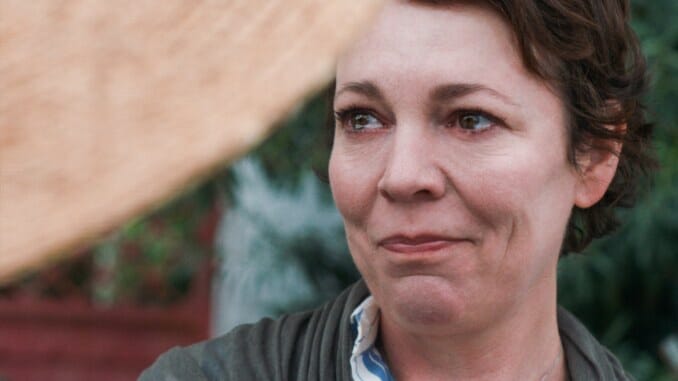The Lost Daughter Understands That Womanhood Is Profoundly Complicated

On the beach that comparative literature scholar Leda (Olivia Colman) lounges on throughout The Lost Daughter, the skies are a crystal blue, the beaches a shimmering white, the water warm and translucent. But the shore is also infested with crass, noisy people; Leda’s fruit infected by a malignant rot; her bedroom contaminated with screeching bugs; a little girl’s doll corrupted by noxious black liquid and writhing insects. This tonal tension is symptomatic of the film’s spirit: It’s a glossy apple, rapidly decaying from the inside out.
The film takes place over a couple of days as Leda settles into a lavish working vacation. Her relaxation is interrupted, however, when she first lays eyes on Nina (Dakota Johnson), a beautiful, inscrutable young mother. Leda becomes obsessed with Nina, as the latter inadvertently resurfaces troubling memories of Leda’s own distressing experiences as a mother. From that moment onward, Leda’s haunting memories permeate The Lost Daughter until the apple is completely black.
While the narrative itself, adapted from Elena Ferrante’s 2006 novel of the same name, is relatively straightforward, debut director Maggie Gyllenhaal, who also wrote the screenplay, tackles themes of internalized and externalized sexism with agility and complexity. The film is told largely from the perspective of the frosty, introverted Leda, whose viewpoint is anything but objective. On the first day of her vacation, Leda treats other people on the beach like a nuisance, and we feel the seething irritation of an interrupted afternoon right alongside her. She bickers with the meddlesome Callie (Dagmara Dominczyk) and even dismisses the handsome and helpful bartender Will (Paul Mescal). But then Nina strolls onto the beach, and everything changes.
We see Nina differently than anyone else. While the majority of the film is shot in extreme close-up, Gyllenhaal and cinematographer Hélène Louvart take care to shoot Nina from afar, displaying her long legs and bare torso, immediately rendering her in a sexual light and playing to the male gaze. Her close-ups aren’t much different: Her eyes often nearly meet the lens; we linger on her skin as her daughter Elena pours water over her body.
It isn’t long before we realize that, in the way she looks at Nina, Leda is externalizing the shame she constantly experiences with regards to her own sexuality. Flashbacks are interspersed into The Lost Daughter’s primary narrative: First sparing, and eventually overwhelming. Young Leda, played effervescently by the enigmatic Jessie Buckley, has two toddlers of her own: Martha and Bianca. Leda is ambitious, and her career as a scholar is just beginning to blossom. But her girls are difficult, and her sweet yet clueless husband Joe (Jack Farthing) isn’t much help. A bubbling vat of frustration and disillusionment, Leda’s intense sexual attraction to her peer Professor Hardy (Peter Sarsgaard) eventually serves as a catalyst that allows her to finally become her own woman—not just a mother.
-

-

-

-

-

-

-

-

-

-

-

-

-

-

-

-

-

-

-

-

-

-

-

-

-

-

-

-

-

-

-

-

-

-

-

-

-

-

-

-








































